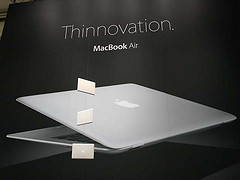 If you didn’t have a chance to see history made last week, you should go watch it. History was made with yet another computer company announcing yet another laptop with better specs than the generation before. Yet somehow, Steve Jobs’ keynote address at Macworld announcing the Macbook Air was different. Historically different.
If you didn’t have a chance to see history made last week, you should go watch it. History was made with yet another computer company announcing yet another laptop with better specs than the generation before. Yet somehow, Steve Jobs’ keynote address at Macworld announcing the Macbook Air was different. Historically different.
There have only been a few similar occasions in history where the future of computing has changed so dramatically. The Apple II in 1977. The IBM PC in 1981. Windows in 1990. Windows 95. AOL’s unlimited internet access in 1994. The standardization of computers without floppy drives.
The Macbook Air defined a new standard in computers. Steve Rubel thinks it has to do with “cloud computing” and it may. However, I think the the standard is fundamentally more practical. There is no optical drive (CD ROM or DVD).
Since last weeks keynote, I’ve posed my thoughts to friends and colleagues and the general consensus is that people need optical drives and the lack of one would prevent them from purchasing. That may be, but the new standard has been set, much like the floppy drive, and the stake has been driven through the heart of optical media.
Let’s think about this. We don’t need optical media for backups – most of us couldn’t fit backups on the discs and we have external drives. We don’t need optical media for file transfer – we have thumb drives and the internet. We don’t need optical media for music – that’s what mp3’s and digital formats are for. Plus, increasingly people buy their music and movies online. What do we really need optical media for that can’t be achieved digitally.
As well, Apple has a vested interest in eliminating the optical disc. Optical discs are competitors to the iTunes store in the music industry. CD and DVD players are direct competitors to Apple TV, iPods and iPhones.
But it’s not just Apple that benefits from the demise of the optical disc. Microsoft benefits – they have Zunes and Xbox Live. Dell benefits – they can lower prices more by not including superfluous hardware. Cisco benefits from increased reliance on wireless networking (Cisco owns Linksys, the market leader in consumer wireless routers). Google benefits as a provider of decentralized (web based) services. The music and movie industry benefits as updating DRM schemes can be done in batch as opposed to mass producing new discs to support new standards.
Everybody benefits from the elimination of optical and that is why the death sentence, and thus history, was issued last week. Your thoughts?
Photo credit to Kenn Christ
